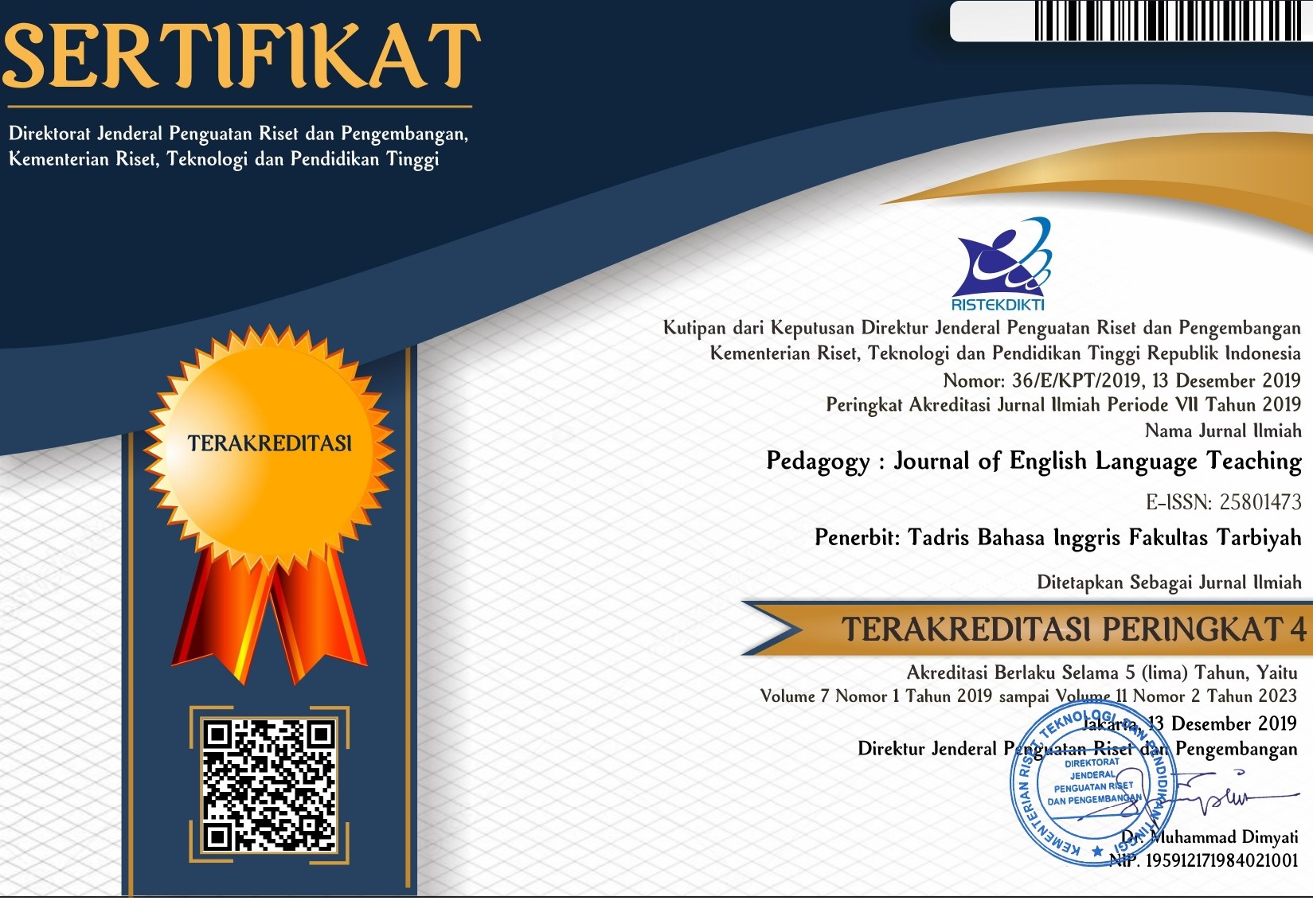Students’ Perceptions of Using WhatsApp to Foster Autonomous Listening Skills in English Language Learning
DOI:
https://doi.org/10.32332/joelt.v13i1.10198Keywords:
autonomous learning, cognitive control, listening skill, Mobile-assisted language learning, WhatsApp integrationAbstract
The optimization of WhatsApp as an alternative medium aimed to support learner autonomy and address time constraints in conventional learning, particularly in listening classes. Limited face-to-face meetings reduced students’ opportunities to practice their listening skills. Therefore, WhatsApp was utilized to foster autonomous learning, enabling students to practice listening beyond the classroom. This study aimed to explore the use of WhatsApp as a teaching medium to promote learner autonomy and to investigate students’ perceptions of conducting autonomous listening activities. A qualitative research design was employed, involving 10 students from the Basic Training Class at Happy English Course selected through purposive sampling. Data were collected through observations and semi-structured interviews, then analyzed using data reduction, data display, and conclusion. The findings revealed that students exercised two forms of autonomy control: cognitive process control and learning management control. Students expressed positive perceptions of using WhatsApp for autonomous listening, including ease of access to materials and tasks, increased opportunities for practice, and enhanced motivation through interactive learning. In conclusion, WhatsApp serves as an effective tool to promote learner autonomy and improve students’ listening proficiency.
References
Alam, Z. (2009). Developing listening skills for tertiary level learners. Dhaka University Journal of Linguistics, 2(3), 19–52.
Alamer, A., & Al Khateeb, A. (2023). Effects of using the WhatsApp application on language learners motivation: a controlled investigation using structural equation modelling. Computer Assisted Language Learning, 36(1–2), 149–175.
AlBdour, W. M. (2020). The Effect of Applying the Discussion Strategy on Improving the Listening Comprehension Skills in the English Language among Students of Shoubak University College. Multicultural Education, 6(1).
Bahtiar, D. (2021). EFL Student’s Perception Towards Whatsapp Chat Group for English Learning. Fakultas Keguruan dan Ilmu Pendidikan.
Baron, R. (2021). Students’ Perspective of the Use of WhatsApp Group as an Online Discussion Mode. AL-ISHLAH: Jurnal Pendidikan, 13(3), 2551–2556.
Begum, A. N., & Chowdhury, R. F. (2016). The factors that affect learner autonomy in learning English as a foreign language (EFL) at tertiary level in Bangladesh. Elk asia pacific journal of social sciences, 2(4).
Benson, P. (2013). Teaching and researching: Autonomy in language learning. Routledge.
Borg, S., & Alshumaimeri, Y. (2019). Language learner autonomy in a tertiary context: Teachers’ beliefs and practices. Language Teaching Research, 23(1), 9–38.
Creswell, J. W., & Poth, C. N. (2016). Qualitative inquiry and research design: Choosing among five approaches. Sage publications.
Gilakjani, A. P., & Ahmadi, M. R. (2011). A study of factors affecting EFL learners’ English listening comprehension and the strategies for improvement. Journal of Language Teaching and research, 2(5), 977–988.
Hagger, M. S., & Chatzisarantis, N. L. D. (2012). Transferring motivation from educational to extramural contexts: A review of the trans-contextual model. European Journal of Psychology of Education, 27, 195–212.
Hoe, F. T., Lim, T. H., & Mah, B. Y. (2021). Utilizing whatsapp messenger to enhance listening skills of civil engineering degree students in Mandarin courses at UiTM Penang Branch. International Journal of Modern Languages and Applied Linguistics (IJMAL), 5(1), 51–60.
Ismail, N. S. C., & Aziz, A. A. (2020). The teaching of listening strategies in ESL classrooms. International Journal of Academic Research in Business and Social Sciences, 10(6), 197–209.
Jacobs, M., Vakalisa, N. C. G., & Gawe, N. (2016). Teaching-learning dynamics. Pearson Education South Africa.
Kukulska-Hulme, A., Pettit, J., Bradley, L., Carvalho, A. A., Herrington, A., Kennedy, D. M., & Walker, A. (2013). Mature students using mobile devices in life and learning. In Innovations in Mobile Educational Technologies and Applications (hal. 219–253). IGI Global Scientific Publishing.
Kukulska-Hulme, A., & Shield, L. (2008). An overview of mobile assisted language learning: From content delivery to supported collaboration and interaction. ReCALL, 20(3), 271–289.
Lengkanawati, N. S. (2017). Learner autonomy in the Indonesian EFL settings. Indonesian Journal of Applied Linguistics, 6(2), 222–231.
Liu, H. (2015). Use of learning strategies by EFL learners: A study of how it relates to language proficiency and learner autonomy. International Journal of English Linguistics, 5(2), 21.
Mahmud, E., Pujiastuti, P., & Saifudin, M. F. (2022). Analysis of the Listening Ability of PGSD Students in Online Learning. AL-ISHLAH: Jurnal Pendidikan, 14(3), 3057–3064.
Maulina, M., Hastianah, H., & Herianah, H. (2023). Undergraduate Studentsâ€TM Perception of the Use of WhatsApp-Based Speaking Instructional Materials. Indonesian TESOL Journal, 5(1), 58–75.
Melani, M. (2020). The Effect of Google Classroom assisted extensive listening on listening comprehension accross learning autonomy. Lingua Cultura, 14(1), 129–142.
Melania, D., & Savitri, W. E. (2022). Promoting Learners’autonomy Through Video Recording In Public Speaking Class. Journal of English for Academic and Specific Purposes (JEASP), 5(1).
Miles, M. B., Huberman, A. M., Rohidi, T. R., & Mulyarto. (1992). Analisis data kualitatif: buku sumber tentang metode metode baru. Penerbit Universitas Indonesia (UI-Press).
Mujayanah, S., Maruf, N., & Asari, S. (2023). Whatsapp use on reading comprehension: Exploring the impact among EFL learners. English Review: Journal of English Education, 11(2), 391–404.
Nabiyev, A. I., & Idiyev, A. R. (2022). The importance of listening in learning English. Innovative Developments in Sciences, Education and Humanities, 12-13.
Oksuz-Zerey, M. (2021). Perceived Benefits Of Whatsapp Voice Messaging: Investigating Efl Students’experiences. European Journal of English Language Teaching, 6(3).
Pemberton, R. (2004). Teaching and Researching Listening: M. Rost; Longman, Harlow, 2002, xii+ 309 pages. Pergamon.
Rambe, P., & Bere, A. (2013). Using mobile instant messaging to leverage learner participation and transform pedagogy at a S outh A frican U niversity of T echnology. British Journal of Educational Technology, 44(4), 544–561.
Santihastuti, A., & Oktavia, F. N. (2023). Teacherâ€TM s Roles and Challenges in Fostering Studentsâ€TM Learning Autonomy:-. EFL Education Journal, 10(1), 78–89.
Savitri, K. A. R. (2022). Effective Strategy in Writing with WhatsApp in EFL Context. International Journal of English Education and Linguistics (IJoEEL), 4(2), 137–144.
Siswahyuni, A., Melvina, M., & Sesmiyanti, S. (2023). Students’ Perception of Using Note-taking in Listening. English Teaching and Linguistics Journal (ETLiJ), 4(2), 147–153.
Suri, D., & Zulkarnain, I. (2022). The Effect Of Power Point Presentation Technique On Students’achievement In Listening. Excellence: Journal of English and English Education, 2(1), 16–20.
Syairofi, A., Suherdi, D., & Purnawarman, P. (2023). Using WhatsApp to support English language learning: A systematic review. Computer Assisted Language Learning, 24(1), 305–337.
Thanasoulas, D. (2000). What is learner autonomy and how can it be fostered. The internet TESL journal, 6(11), 37–48.
Tirtanawati, M. R., & Salsabila, D. S. (2021). English students perception on the use of whatsapp group in speaking class. Journal of English Language Teaching, Linguistics, and Literature Studies, 1(1).
Tran, T. B. T., & Vuong, T. K. (2023). Factors affecting learner autonomy in tertiary level English learning: A study at Van Lang University. International Journal of TESOL & Education, 3(1), 1–18.
Tran, T. Q., & Duong, T. M. (2020). EFL learners’ perceptions of factors influencing learner autonomy development. Kasetsart Journal of Social Sciences, 41(1), 194–199.
Ward, M. O., Grinstein, G., & Keim, D. (2010). Interactive data visualization: foundations, techniques, and applications. AK Peters/CRC Press.
Zhang, D., Zhao, J. L., Zhou, L., & Nunamaker Jr, J. F. (2004). Can e-learning replace classroom learning? Communications of the ACM, 47(5), 75–79.
Downloads
Published
Issue
Section
License
Copyright (c) 2025 Iwan Setiawan , Thoyyibah Thoyyibah

This work is licensed under a Creative Commons Attribution-ShareAlike 4.0 International License.
















